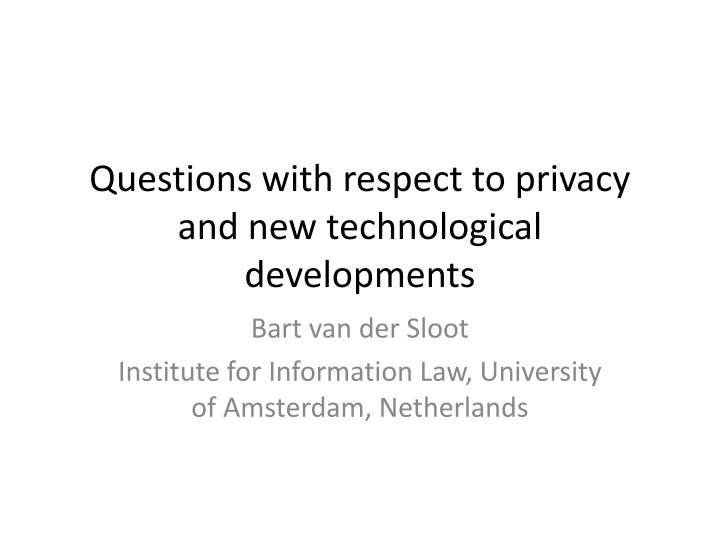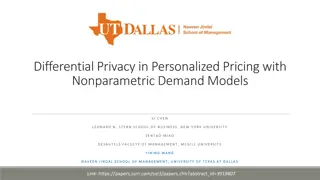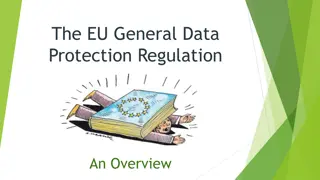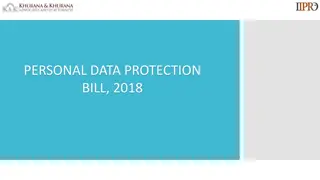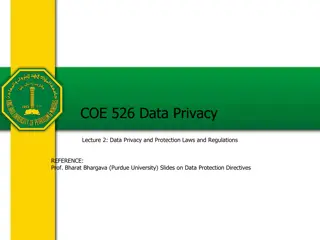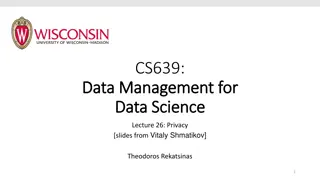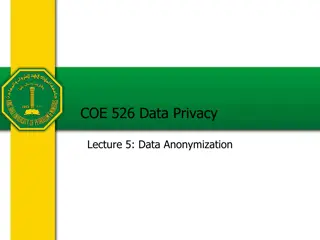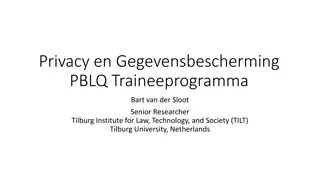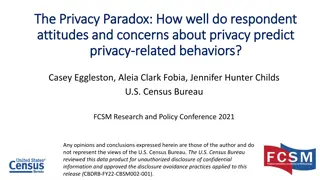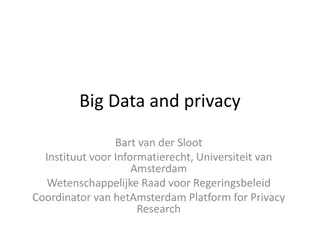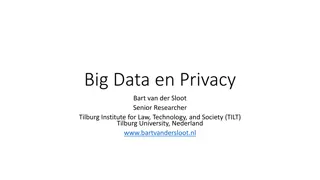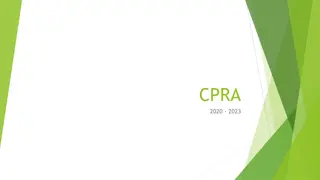Privacy and New Technologies: Questions on Personal Data Relevance and Regulation
Explore the relevance of personal data in today's technology-driven world, questioning its impact on privacy and regulation. Delve into the challenges of regulating data gathering, access, and usage while considering the evolving landscape of privacy responsibilities in product development.
Download Presentation

Please find below an Image/Link to download the presentation.
The content on the website is provided AS IS for your information and personal use only. It may not be sold, licensed, or shared on other websites without obtaining consent from the author.If you encounter any issues during the download, it is possible that the publisher has removed the file from their server.
You are allowed to download the files provided on this website for personal or commercial use, subject to the condition that they are used lawfully. All files are the property of their respective owners.
The content on the website is provided AS IS for your information and personal use only. It may not be sold, licensed, or shared on other websites without obtaining consent from the author.
E N D
Presentation Transcript
Questions with respect to privacy and new technological developments Bart van der Sloot Institute for Information Law, University of Amsterdam, Netherlands
3 Questions (1) Is the concept of personal data still relevant? (2) Can we still regulate the gathering of/access to data? (3) Are the privacy responsibilities a problem for the development of new product?
(1) Is the concept of personal data still relevant? personal data means any information relating to an identified or identifiable natural person ( data subject ); an identifiable natural person is one who can be identified, directly or indirectly, in particular by reference to an identifier such as a name, an identification number, location data, an online identifier or to one or more factors specific to the physical, physiological, genetic, mental, economic, cultural or social identity of that natural person
(1) Is the concept of personal data still relevant? However, it is also possible to influence people or have an impact on their lives by using non- personal, aggregate and meta data While the status of a datum (personal - non- personal; sensitive - non-senstive; content meta data; identifying anonymous; specific aggregated; etc.) used to be relatively stable, these are currently rather fluid stages. Should we move to a more neutral terminology?
(2) Can we still regulate the gathering of/access to data? Most of the current privacy and data protection rules focuss on gathering and storing data: Purpose and purpose limmitation Safety and confidentiality Quality and transparancy Data minimalisation and storage limmitation
(2) Can we still regulate the gathering of/access to data? In practice, however, we see that citizens, companies and states alike gather large amounts of data. Can we instead or in addition also regulate: The analysis of data The use of data
(3) Are the privacy responsibilities a problem for the development of new product? The current legal regime mostly lays the responsibility for upholding the legal safeguards on one or a few selected organisations. Controller means the natural or legal person, public authority, agency or other body which, alone or jointly with others, determines the purposes and means of the processing of personal data; where the purposes and means of such processing are determined by Union or Member State law, the controller or the specific criteria for its nomination may be provided for by Union or Member State law
(3) Are the privacy responsibilities a problem for the development of new product? In practice, however, we see that data streams are increasingly shared between departments, between organisations and crossing national borders. Data are combined, cross-pollinated with online/open-access data and harvested by algorithms. In such a diffuse situation, who is and should be responsible for upholding the legal obligations? Can the responsibility still be placed on one or a few organisations?
(3) Are the privacy responsibilities a problem for the development of new product? Three potential problems: (1) Unclearity about division of responsibilities (2) New and stricter norms in General Data Protection Regulation (3) New and stricter norms on transnational data flows
